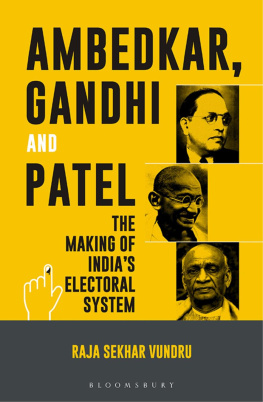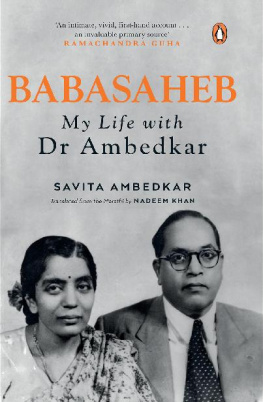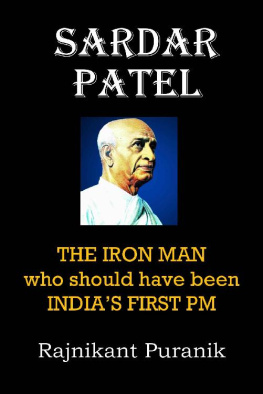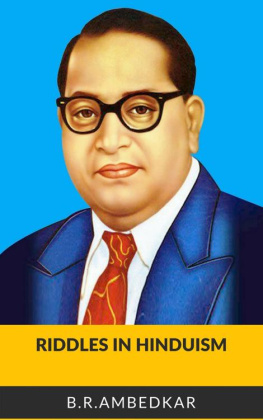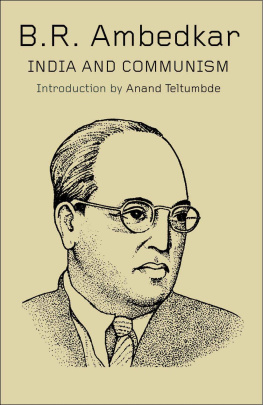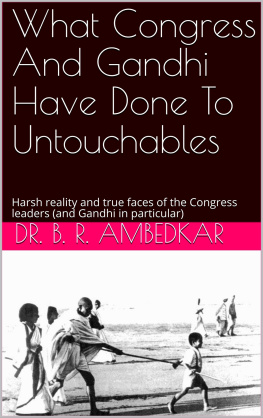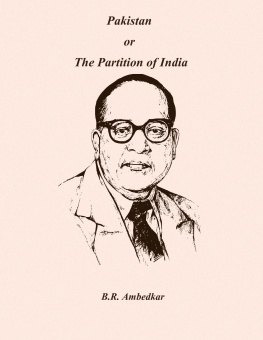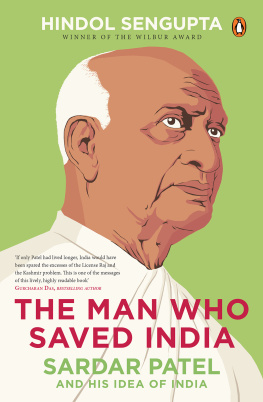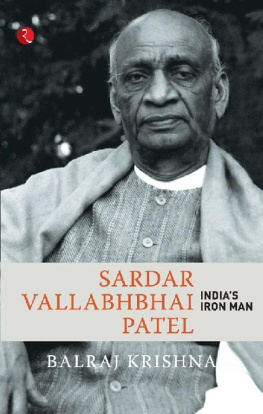Content

AMBEDKAR, GANDHI AND PATEL
THE MAKING OF INDIA'S ELECTORAL SYSTEM
AMBEDKAR, GANDHI AND PATEL
THE MAKING OF INDIA'S ELECTORAL SYSTEM
RAJA SEKHAR VUNDRU

First published in India 2018
2018 by Raja Sekhar Vundru
All rights reserved. No part of this publication may be reproduced or transmitted in any form or by any means, electronic or mechanical, including photocopying, recording, or any information storage or retrieval system, without prior permission in writing from the publishers.
No responsibility for loss caused to any individual or organization acting on or refraining from action as a result of the material in this publication can be accepted by Bloomsbury or the author.
The content of this book is the sole expression and opinion of its author, and not of the publisher. The publisher in no manner is liable for any opinion or views expressed by the author. While best efforts have been made in preparing this book, the publisher makes no representations or warranties of any kind and assumes no liabilities of any kind with respect to the accuracy or completeness of the content and specifically disclaims any implied warranties of merchantability or fitness of use for a particular purpose.
The publisher believes that the content of this book does not violate any existing copyright/intellectual property of others in any manner whatsoever. However, in case any source has not been duly attributed, the publisher may be notified in writing for necessary action.
BLOOMSBURY and the Diana logo are trademarks of Bloomsbury Publishing Plc
E-ISBN 978 93 86826 24 4
2 4 6 8 10 9 7 5 3 1
Bloomsbury Publishing India Pvt. Ltd
Second Floor, LSC Building No.4
DDA Complex, Pocket C 6 & 7, Vasant Kunj
New Delhi 110070
www.bloomsbury.com
Created by Manipal Digital Systems
To find out more about our authors and books visit www.bloomsbury.com.
Here you will find extracts, author interviews, details of forthcoming events and the option to sign up for our newsletters.
To
my wife, Neerja
and our lovely children,
Udayan and Tamara
Elections effect all of us. In every way. Whether we participate in them or not. Nations and democracies have devised several electoral methods to decide a winner. The electoral methods were changed based on the nature of composition of the society and the polity. I got caught onto the idea of separate electorate system that was in vogue during colonial period and worked for a decade and a half pursuing the idea of electoral system of India. It would have been difficult to write this book without the people around me who all knew that I can start a book but few believed that I can actually finish one, due to my varied commitments.
Rajesh Ramachandran is the one who consistently encouraged me to write over the last fifteen years, starting with our Delhi Press Club evenings, supported and ensured that the book will see the light of the day. His wife Sanju Ramachandran, a keen observer - saw the literary streak in me. Harish Damodaran made the right queries and showed keen interest during the progress of the book.
For a reasonably complicated topic like electoral systems I had the privilege of academia encouraging, advising and bringing me the critical input. Foremost is Prof. S. Japhet, Vice Chancellor, Bangalore Central University. I had the honour of meeting and discussing with top class academia - Prof. Sukhadeo Thorat, Prof. K. S. Chalam, Prof. Marc Galanter, Prof. Valerian Rodrigues, Prof. Gopal Guru, Prof. R. K. Kale, Prof. Y. S. Alone in New Delhi; Prof. late G. Krishna Reddy in Hyderabad, Prof. Suresh Mane in Bombay and Dr. Deepak Kumar in Patiala who offered a great insight.
Political scientist couple, Avinash Kumar and Puja Rani consistently sharpened my arguments during my visits to Jawaharlal Nehru University.
Friends deeply engrossed in the dalit movement: Mallepalli Laxmiah, Korivi Vinay Kumar, Sirivella Prasad and Bolimera Anand- gave me to understand, deeper ground realities about the way electoral system works in India.
My colleagues in the civil services who have seen the electoral system at play - especially Koppula Raju, Amar Singh, Avtar Singh, Anil Kumar, Parvathaneni Harish, T.S.Jawahar, Arun Solanki, Atul Tiwari, V.Venu, G.Kamalavardhana Rao, Kumara Naik, G. Ananth Ramu, Amarnath, D.Suresh, S.M. Somashekhar and Gotte Sudheer Babu were of immense source of strength.
It was Sudipto Mookherjee, National Sales Head, Trade Division, Bloomsbury who discovered me over a lunch. Discussion with Nitin Valecha, Manager Acquisitions and Syed Dilshad Ali, Designer were very fruitful in the final outcome. My very first meeting with Rajiv Beri, Managing Director gave me all the energy to take the dip. It was the patience and support from Praveen Tiwari, Publisher, Bloomsbury who consistently made me believe that I can finish this book and that its an important work - made all the difference.
My Parents to whom I owe my existence, Vundru Suryanarayana and Vundru Rajeswari, believed in my abilities to write and always enjoyed my writings. During my research days in Delhi, my brother V.L.Kantha Rao, his wife Neelam Rao and their inquisitive sons Shaswat Rao and Sanidhya Rao bore Taujis presence. My brothers in law - Kapil Dev, his wife Urvashi and their sweet daughter Sukhmani; Deepak Kumar and his wife Khayati always welcomed bavagarus writings.
One of my earliest breaks from my busy job was in 2005 when I went on to stay with my sister Jaya Rao in New York, where I focused on my literary work and also had the opportunity to attend the Harlem Book Festival. Her deep engagement about the way my life shaped and her influence has a major role in my writings. Her sons Rajat Rao and Teja Rao always enjoyed pedda mamais presence.
Finally, family. This book would not have been possible without the unflinching support of my wife, Neerja and deep love of our children - Udayan and Tamara, who have, over the years put up with my frequent absence from home.
For all the lacunae, errors and inadequacies that may remain in this book, of course, the responsibility is entirely mine.
Contents
Elections are always fascinating, important and most of the times, crucial as they always decide who eventually will be representing the people in a democracy. In the Presidential elections of November 2016 in United States of America, Donald Trump of the Republican Party was elected as the President defeating his rival from the Democratic Party Hillary Clinton under an Electoral College system. However, Trump lost to Clinton by almost eight million votes at the national count. This dichotomy has resulted in questioning the electoral system under which the USA elects its President and the representatives to its legislative bodies.
An electoral system is one which translates votes into seats, thereby enabling a government elected by the people in a democracy. In the case of the Presidential election in the US, it is the total number of seats, also called Electoral College votes, that a candidate needs to win and not the total votes polled country-wide. Like India, the USA also follows what is called the First Past The Post (FPTP) System where in an electoral constituency or seat, the candidate to whom the largest number of valid votes have been given is declared elected. In the American Presidential election, a candidate must win the 270-Electoral College votes out of the 538 to become the President. Each state has a fixed number of such votes - California has 55, Texas 38, Florida 29 and so on. The system is so designed that whosoever gets the highest number of votes in a state will win all the Electoral College votes available from that State. This is known as winner-takes-all. But the winner is not bound to get more than fifty percent vote like in French presidential election. California state has 55 electoral college votes and Clinton with 61.6 per cent was a clear winner. But it was a close call in many states. In New Hampshire, Clinton got 348,521 (47.6 per cent) and Trump 345,789 (47.2 per cent) and the winner of that state, by a narrow margin of 2,732 votes, took all the four electoral college votes. In the 2016 election, the national popular vote of that country, total votes polled all over the country irrespective of states, was 64,874,143 (48.1per cent) in favour of the defeated candidate and the winner got 62,516,883 (46.4 per cent). None of the candidates however received an absolute majority of fifty percent votes and above, like in a French Presidential election.

